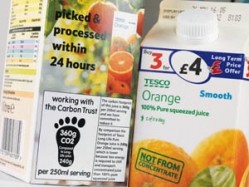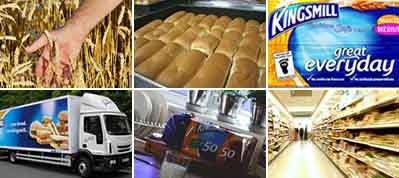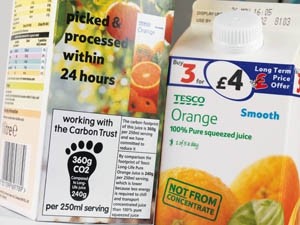Tesco ploughs lonely furrow with carbon footprint labels

While Tesco has ambitious plans to add carbon footprint labels to more than 500 own-label lines, Asda, Sainsbury's, The Co-op Group and M&S all say they have no plans to follow suit, citing concerns about overcrowded product labels, inconsistent methodology for calculating footprints and confusion amongst shoppers.
Asda corporate social responsibility director Paul Kelly said it was the job of Asda's buyers – and not its customers - to discriminate between products on the basis of their environmental credentials, adding: “I’m pretty sceptical about putting this information on labels and whether it will really mean anything to people."
The Co-operative Group added: "Like other retailers, we are committed to carbon footprinting and have carried out research relating to the issue. However, we would prefer to act on the findings to reduce the carbon emissions associated with our products, not simply label them."
Another retail source told FoodManufacture.co.uk: "We're not convinced about footprint labels - how precise is the data - and will it just confuse consumers?"
Slow burn
However, Carbon Trust carbon footprinting general manager Euan Murray said he remained confident that other food retailers would follow Tesco's lead, adding: “We might well see an announcement on this front [from a supermarket] this year.”
He also rejected claims that the inability of shoppers to make meaningful comparisons between products (as so few were currently labelled) meant that carbon footprint labels served no useful purpose.
“The carbon footprint label is a sign to shoppers that the manufacturer of that product cares about its environmental footprint and is actively trying to reduce it. Over time, as things evolve and we reach critical mass, shoppers will be able to use the labels to compare similar products."
In the meantime, Tesco was increasingly using the labels to engage with shoppers and explain what role they could play in reducing the carbon footprint of the products in question by cooking or storing foods in a particular manner, he said.
“Take potatoes. If you cook them with the lid on, you can reduce carbon and save on your utility bills. The label is not an end in itself, it can help people to see that they can do their bit too.”
He added: "We are continuing to see an acceleration in our growth in the UK, the US and all the other markets in which we operate.”
Reinventing the wheel
To gain critical mass, however, food and drink retailers and manufacturers would have to collaborate more effectively in order to avoid costly duplication on lifecycle analysis work, he accepted.
“Ideally, firms should be able to take the relevant data and plug and play.”
This was particularly the case with packaging, where multiple companies were using the same materials, he said. “There is huge scope to work collaboratively on this.”
Speaking at the Consumer Goods Forum conference last month, Tesco boss Sir Terry Leahy said that sharing information would help drive the implementation of carbon footprint labelling: “The prize in time could be a single open-source repository for this data, shared across our industry."
Much of this information was already available to manufacturers via the Carbon Trust, which had collated data on carbon emissions for transport costs, commodities, packaging and raw materials that were likely to be relevant for a wide range of consumer goods, said Murray.
A publicly available registry of products that had already been certified was also available for firms to look at before commencing their own analyses, he added.















